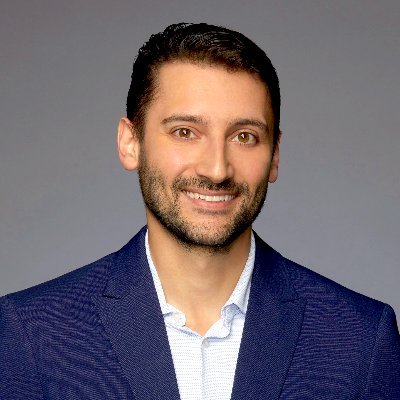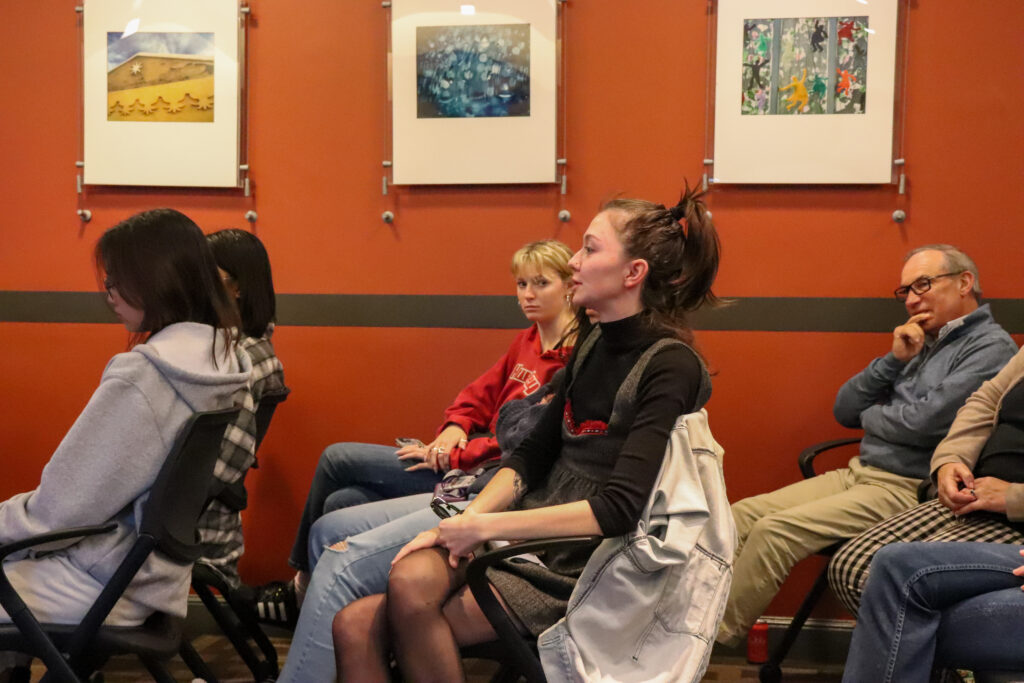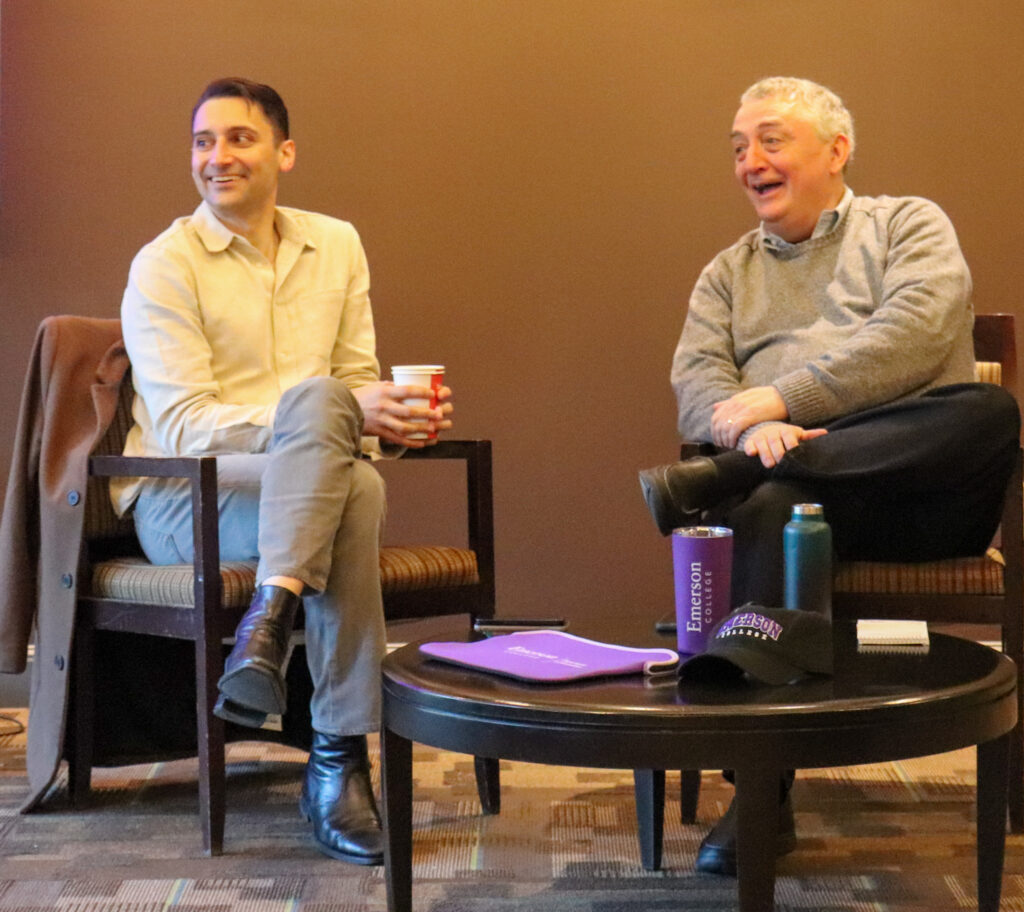Five Things to Know About Covering the ‘Dystopia Beat’

Few journalists can say they routinely take phone calls from Steve Bannon, the former chief strategist of the Trump administration and outspoken conspiracy theorist. Even fewer can say he tried to recruit them to join “his side.”
For NBC reporter Ben Collins ’10, it’s all part of the job—investigating the spread of disinformation and conspiracies that originate from the dark corners of the internet.

“[Bannon] was like, ‘You are really good at what you do, and we wish you were on our side’,” Collins said when remembering the phone call. “What side? Felons?”
It’s this bluntness and humor that allow Collins to continue covering the “dystopia beat,” a journalist’s moniker for topics like extremism, disinformation, and conspiracy theories. An alum of the Emerson Journalism program, Collins visited campus on a Friday in October to discuss the dystopia beat with his former journalism professor, Mark Leccese, and a roomful of nearly three dozen students and faculty.
While Collins’s work is undoubtedly complex, here are five takeaways from the talk:
Have a base amount of empathy.
Collins admits it is not easy to interview conspiracy theorists, especially when the lies they’re perpetuating harm others. Still, he recognizes how loss can affect a person’s wellbeing and skew their perception of reality.
“I have learned empathy at scale,” he said. “You have to take a real step back and look at this anthropologically… Maybe their life is more precarious, and things are harder, and they can’t keep up with it. They go searching for easy answers… You have to go in with the idea that something else broke first.”
Do no harm to your sources.
A large portion of his talk was dedicated to a story that took Collins years to complete. He discussed an extremist group that targets transgender individuals, exposing their identifying information with malicious intent—also known as doxxing. Other times, the group would “swat” their victims—“a term for when an anonymous person sends an urgent, false tip to the police about a violent crime in a victim’s home in the hopes that law enforcement will raid it and potentially harm the person inside.” Members of the group even went so far as to call their targets’ workplaces, claiming they were pedophiles.
“These people could not live their lives, straight up,” Collins said.
When he first began covering this extremist group, Collins realized he couldn’t publish his findings immediately. He said that researchers at Harvard had been analyzing the group’s attacks, studying how coverage would “reignite the unrest.” Even if his sources were willing to go on record, the victimization would only continue unless he had “a knockout punch” to report on the issue.
“If you are doing harm to somebody who already had the harm done to them, you are not doing your job,” Collins said.
Years later, when a prominent Twitch streamer was targeted, the story had enough momentum to be published, as the streamer was already a public figure and openly discussed her experience on public forums. Collins knew that his waiting preserved the safety of others who had been targeted by the group.
Ultimately, internet security service vendor Cloudflare announced that it would block the site, destabilizing the digital forum.

Recognize when you have to cover something and when you shouldn’t.
An audience member asked Collins how he ethically covers extremist groups and conspiracy theorists without giving them more power through media attention. He said it’s important to take the magnitude of someone or something into consideration. If a mass amount of people are being affected by an extremist organization or a harmful conspiracy theory, it becomes necessary to report on it.
Still, Collins admits, it isn’t black and white.
“There is a thin line. There’s no art or science,” he said. “During the Trump years, we would be like, ‘Trump’s just going to tweet about this and when he does, we can write a story.’ Now it’s a lot more complicated. There are a lot more figureheads that determine what’s big in the far-right spaces.”
Know what you don’t know.
Journalists can benefit from modesty. Collins said working in the industry for over a decade has reminded him how much he doesn’t know. He finds it helpful to turn to others for information, inspiration and advice.
“Engage in pure partnership with your colleagues. Build that fraternity with people who know what it’s like,” he advised.
Remain resilient.
Covering the dystopia beat has its repercussions, both personal and professional, Collins has learned. He recalled a recent incident when members of an extremist group found his parents’ address. Collins was concerned that they would attempt to “swat” their house.
Other attacks are less serious, and Collins is able to find humor in the attempt. Another hostile organization attempted to find his information online, only to accuse him of being a wealthy hypocrite and an heir to the Vanderbilt fortune. In reality, the Ben Collins they found is a 47-year-old British race car driver.
Reporter Collins aptly changed his Twitter bio to reflect this error: “47-year-old race car driver. Sole heir to the Vanderbilt fortune. Senior reporter, dystopia beat, @NBCNews.”
Joking aside, he understands that navigating professional obligation and personal safety requires steady resilience.
“I had to take this really seriously. So I did, I kept following these people… where all the truthers went to, where they’re getting money, how they were touching other people in our culture…,” Collins said. “And I just didn’t quit.”
Collins encouraged any aspiring journalist or student interested in the dystopia beat to pursue their ambitions. He emphasized the importance of younger generations, stating that they’re the future.
“If you want to live in a decent place in this country, you have to start trying to shine a light,” Collins said. “And I mean this deeply, sincerely: You guys have the ability and power to change stuff.”

Categories
Isabella Luzarraga View All
Isa is a senior journalism major minoring in media studies. She is from Omaha, Nebraska but loves coming back to the city. Outside of coursework, Isa is the Managing Editor of Your Magazine, the secretary of Emerson's chapter of NAHJ and a freelance writer for publications nationwide. She loves reading in the Common, going for long runs and sipping iced coffee.